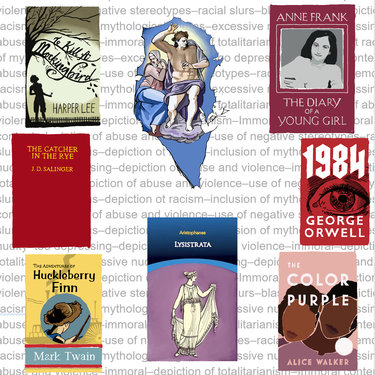Art reflects life and inspires us to reflect on our own lives
Art, in all of its forms, reflects the culture that creates it. We live in an imperfect world and all of the work we produce reflects that.
We need to engage with art that includes those imperfections, but we should equally be careful of how we present it.
We like the column Guilderland’s library director, Pete Petruski, recently wrote for The Enterprise that started with this quote from librarian Mary Jo Godwin: “A truly great library contains something in it to offend everyone.”
Each of us has our own way of seeing the world. We bring who we are to the art gallery when we look at paintings or sculpture, or to the theater when we see a play, or to the library when we read a book or newspaper.
In turn, whoever created that art, or play, or poem brought his or her or their intention in creating it.
We’re ruminating on this because at the last Guilderland School Board meeting, two Jewish board members said they found this spring’s high school musical, “My Favorite Year,” to be antisemitic.
We believe them.
Meredith Brière spoke of “problems with certain tropes, they aren’t always initially obvious to us” and recommended a committee made up of a student, staff member, and DEI Committee member review scripts in the future.
Nina Kaplan agreed. She quoted from an Anti-Defamation League report: “We must never normalize even seemingly harmless forms of hate-based prejudice; this is what strengthens dangerous social attitudes, which can erode the values of even the most just society. Silence and complacency in the face of biased remarks or actions permits others to internalize harmful messages, making such messages commonplace.”
The next sentence in that report is this: “Antisemitism is unique in many ways, but, like other forms of hate, it grows in silence and blossoms in acquiescence.”
So we commend these two women for speaking up about how and why the school play made them feel uncomfortable.
The school board president, Blanca Gonzalez-Parker, then said that, while she was not Jewish, she had experienced what her colleagues had in seeing the play.
She went on, “I also found some of the themes around the roles of women to be problematic, and I felt like the lead roles were mostly male and provided character development and opportunities for learning for the males more than for the females. I felt like some of the female roles were misogynistic and stereotypical as well.”
All three praised the work of the students.
I obtained a script of the play, which brought me back to the days of the Guilderland Players’ very first musical, over a half-century ago, when I was a student: “Bye Bye Birdie.”
Both of the musicals are set in the 1950s and both reflect the stereotypes of the era.
“My Favorite Year” centers on a young Jewish male comedy writer in the heyday of live TV shows. In listing the cast, the script describes the female writer on the show as “Lois Lane with a better sense of humor.”
“Lois Lane” of course is shorthand for a quintessential female sidekick; sure, she’s an award-winning journalist but she was created as a love interest for Clark Kent, aka Superman.
In the “Bye Bye Birdie” musical of my youth, although the show is named for the Elvis Presley type figure who powers the plot, the central romance is between Rosie Alvarez, the long-suffering secretary and love interest of songwriter Albert Peterson who is loathed by Albert’s racist mother.
Did the “Bye Bye Birdie” cast members adopt racist attitudes toward Hispanics because of being part of that show, or did the audience by absorbing it?
The director was long-time English teacher Fred Heitkamp and he made a point of discussing racism with the cast. If anything, that play made me more, not less, aware of racism.
Over the years, I’ve attended many rehearsals for school plays and musicals directed by Andy Maycock in order to write about them, and have admired the interplay Maycock has with the students. He takes their work and interpretations seriously as they create flesh-and-blood characters from a paper script.
Asked about this play, Maycock said, “The main character is Benjamin Steinberg (though he goes by “Benjy Stone” until he changes his name back in the final moment of the show) and the Guilderland Players have speculated about whether Benjy’s character is based on Norman Steinberg, who co-wrote the original film’s screenplay.”
Asked about how and why the play was selected, Maycock wrote in an email, “The process for choosing a musical is complicated. From a directing standpoint, the Vocal Director and I read the script and listen to the cast recording to determine whether we think we have the right makeup of students to fill the roles.
“It’s during this stage that we also decide whether the text of the musical is appropriate for a high-school audience. For example, ‘Chicago’ the musical is not, but ‘Chicago - High School Edition’ is a softer version.
“We include the Conductor to find out whether the orchestration will give our student musicians some roles in the pit, and whether we have to hire some professionals to fill out the more difficult books.
“We chose ‘My Favorite Year’ because we liked the music and the story, and because it wasn’t so well-known as to have worn out its welcome on high school stages. We thought its sense of nostalgia would be fun for audiences and some of the broad comedy would be fun for our Players.”
Maycock also wrote, “I was sad, surprised, and sorry to hear that some members of the community found the show to be objectionable. It was certainly not my intent to offend anyone or make them uncomfortable, but of course I understand that my intent and the project’s impact are two different things.”
I believe him.
Many times, when I get calls from irate readers, I wish I could travel with each newspaper into their homes to explain what my intention was as I wrote.
But, of course, words stand on their own once they are published. So, too, does art speak for itself, long after the artist is dead. I thought of trying to reach Norman Steinberg to ask his intentions in writing “My Favorite Week” and learned he had died in 2023.
But really, what matters is what we bring to a play or any artwork. Could there have been someone in the audience as the Guilderland Players performed “My Favorite Week” who had struggled to overcome alcohol addiction and so was offended by the Alan Swann character, a drunken Hollywood star?
Or could there have been someone in the audience who, like the character Swann, was estranged from his daughter and felt the play made light of that loss?
One of the great things about art, including plays, is not only does it come from life and reflect life but it gets us to reflect as well, perhaps on our own lives or on the stereotypes we hold.
From a school perspective, what matters most is what is taught. What did the students in that production learn from being part of it? And, after that, what did their audience come away with?
How a work is presented matters. “Mein Kampf” being handed out by the Ku Klux Klan as a guide to follow is very different from “Mein Kampf” being read by students in a course with a sensitive professor teaching about facism.
We live in a patriarchy but that doesn’t mean that we, even a feminist, shouldn’t look at a Picasso.
And, to end where we began, and perhaps know the place for the first time, those stories that Pete Petruski hates, about Sherlock Holmes, I love them. Why? They teach me about a time when women’s roles were incredibly limited and I see how far we’ve come, and how far we need to go.
This is not something Sir Arthur Conan Doyle intentionally wrote about; he merely reflected his times.
Andy Maycock told us this week that he was proud on opening night for “My Favorite Week,” and he took a picture of the audience from the lighting booth.
“It was like wall-to-wall people,” he said. “I couldn’t believe that a show that nobody knows with a smallish cast … on a Thursday night that so many would show up. I just felt like this is saying something about this community and our music department and how much confidence people have in the kids’ ability.”
He posted the picture online with this message: “Thank you to the community.”
Plays, like all works of art, can provoke us as well as comfort us, can enlighten us as well as frighten us, can anger us as well as placate us. As with any art, a lot of what we take away from a play depends on what we bring to it, and it can help us understand the world we live in.
But what is unique about theater is it brings people together for a shared experience — rare in this era when entertainment often comes from a screen in isolation.
We hope audiences — wall-to-wall people — continue to flock to the Guilderland Players’ shows no matter how they are chosen. We hope those plays continue to inspire responses not just on the school board dais but around kitchen tables and on school bus rides. In that way, a play can help us understand one another.
— Melissa Hale-Spencer, editor



